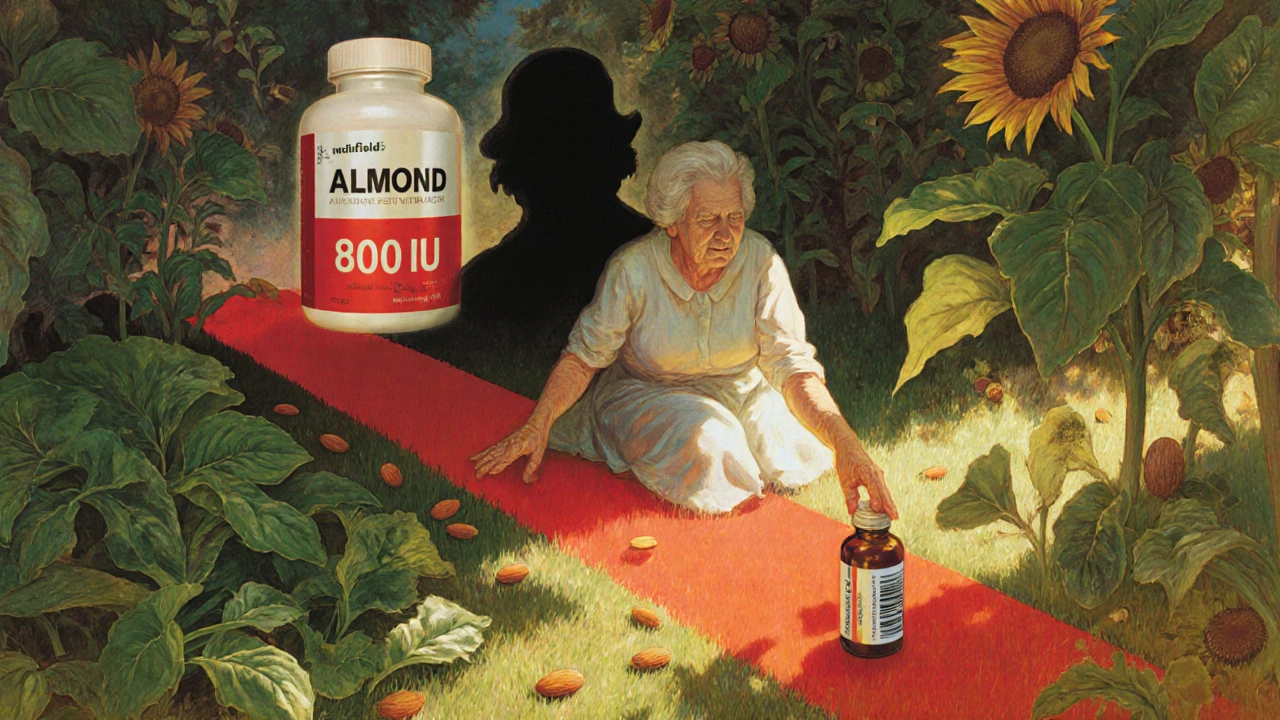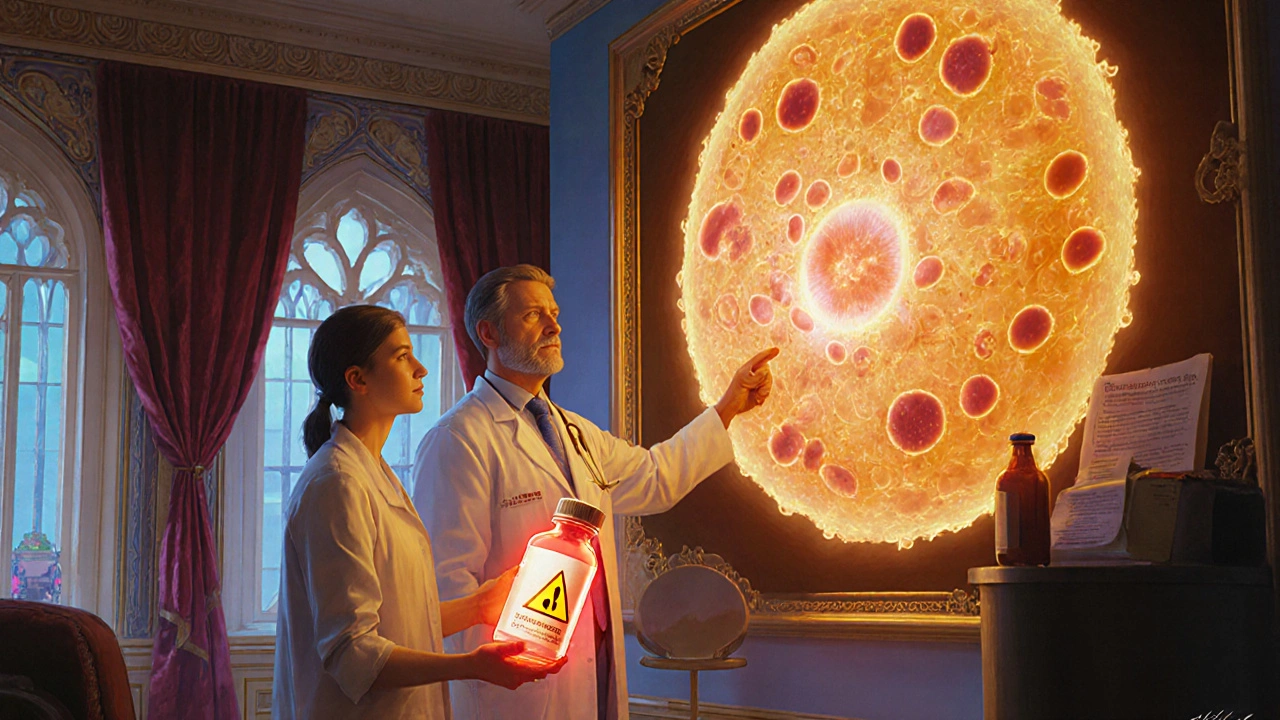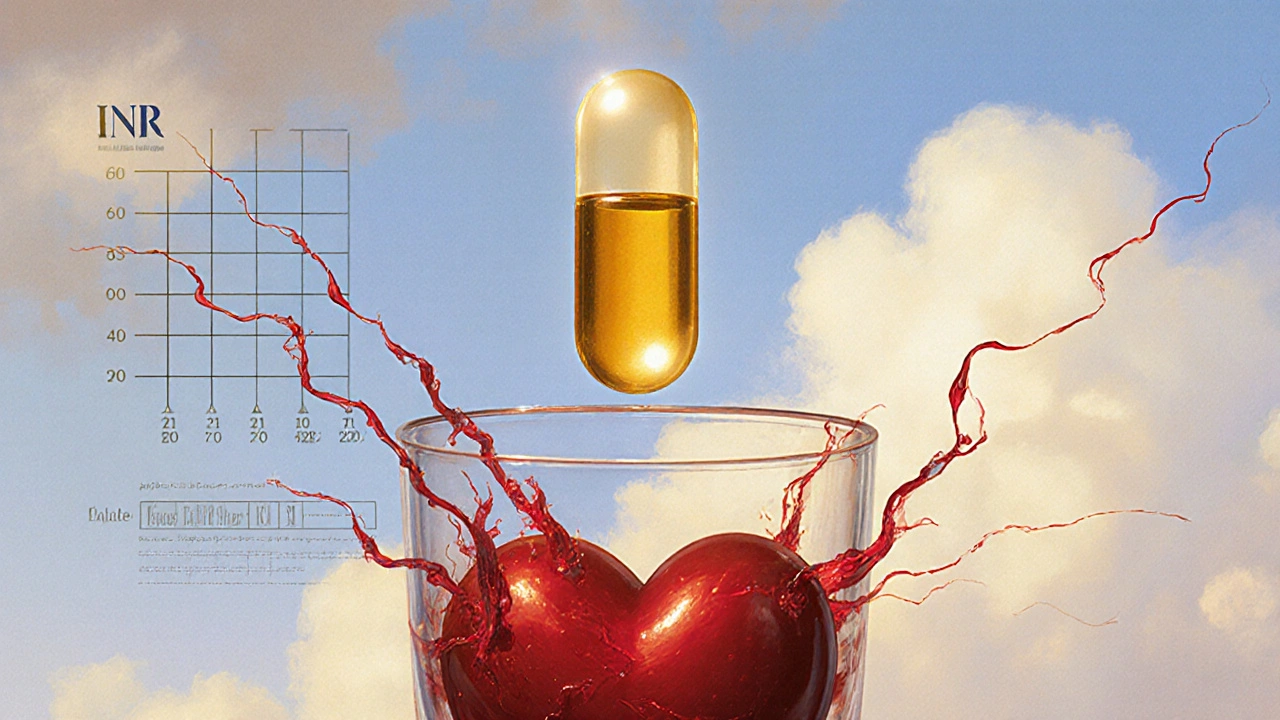Vitamin E & Warfarin Risk Calculator
This tool helps you calculate your daily Vitamin E intake from supplements and food sources to determine if your intake is within a safe range while taking warfarin. Remember: doses above 400 IU may increase bleeding risk.
Your Total Vitamin E Intake
Important Safety Information
Safe Range: Under 400 IU/day
Caution Range: 400-800 IU/day (may increase bleeding risk)
High Risk: Over 800 IU/day (documented bleeding events)
The American College of Chest Physicians recommends avoiding vitamin E supplements above 400 IU if you're on warfarin.
Warning: Even lower doses (100-200 IU) can be risky for some people due to genetic sensitivity.
If you're taking warfarin for a heart condition, blood clot, or mechanical valve, you might be surprised to learn that something as simple as a vitamin E supplement could put you at risk for dangerous bleeding. It’s not a myth. It’s not hype. It’s a real, documented interaction that’s caught doctors off guard more than once - even when patients swear they’re only taking a "little" vitamin E.
Why This Interaction Matters
Warfarin works by blocking vitamin K, which your body needs to make clotting proteins. It’s a tightrope walk: too little, and you risk clots; too much, and you bleed. That’s why your INR (International Normalized Ratio) is checked regularly - it tells your doctor if your blood is clotting at the right speed. Vitamin E, on the other hand, doesn’t directly interfere with vitamin K. Instead, it messes with platelets - the sticky cells that help blood clot. At high doses, it acts like a mild blood thinner on its own. When you add it to warfarin, you’re stacking two thinners together. And that’s where things get risky.The Evidence Is Mixed - But the Risk Is Real
You’ll find conflicting studies. One from 1996 said vitamin E at 800 IU daily didn’t change INR levels in 21 patients. That study got a lot of attention. But here’s what they didn’t see: delayed effects. A later case report showed a patient on warfarin started bleeding severely after four weeks of taking 800 IU of vitamin E daily. The INR didn’t spike until week four. Short-term studies miss this. Real life doesn’t. Then there’s the 2013 study of over 1,000 atrial fibrillation patients on warfarin. Researchers didn’t just look at doses - they measured actual vitamin E levels in the blood. They found that when vitamin E levels hit 4.49 μmol/mmol cholesterol, bleeding risk went up. At 5.56 μmol/mmol cholesterol? Major bleeding risk jumped. And this was independent of other risk factors like age, high blood pressure, or kidney disease. That’s not a fluke. It’s a pattern. And it’s why top anticoagulation clinics now treat vitamin E like a drug - not a harmless supplement.What Dose Is Dangerous?
There’s no magic number that’s safe for everyone. But the evidence points to a clear danger zone: above 400 IU per day. - Studies show no significant risk at 80-120 IU (common in multivitamins).- At 400 IU, some people start showing signs of increased INR.
- At 800 IU and above, bleeding events - including brain bleeds - have been documented.
The American College of Chest Physicians and the University of California San Diego both recommend avoiding vitamin E supplements above 400 IU if you’re on warfarin. The European Society of Cardiology now says: if you’re bleeding for no clear reason while on warfarin, check your vitamin E levels.

What About Lower Doses?
Even 100-200 IU daily isn’t risk-free. Some people are genetically more sensitive. If you have a variant in the CYP2C9 or VKORC1 gene - which affects how your body processes warfarin - you might react strongly to even small amounts of vitamin E. And here’s the kicker: you won’t know you’re sensitive until you bleed. A 30-day study with just three people showed an anticoagulant effect from only 42 IU of vitamin E. That’s less than half the amount in many store-bought supplements. If three out of three reacted, what about the other 99,997 people taking it?What Supplements Are Safe?
If you’re on warfarin, stick to the basics:- Food sources of vitamin E are fine - almonds, sunflower seeds, spinach, and avocado.
- Multivitamins with less than 100 IU of vitamin E are generally okay, but tell your doctor you’re taking them.
- Avoid standalone vitamin E capsules unless your doctor specifically approves them - and even then, keep it under 100 IU.
- Fish oil (especially over 1,000 mg EPA/DHA daily)
- Ginger, garlic, ginkgo biloba
- Turmeric (curcumin)
- Green tea extract (high doses)
What Should You Do?
If you’re on warfarin and taking vitamin E - stop. Now. Don’t wait for a bleeding episode. Then call your anticoagulation clinic or pharmacist. They’ll need to:- Check your current INR.
- Ask you about every supplement you take - even ones you think are "natural" or "safe."
- Set up more frequent INR tests for the next 4-6 weeks.
- Document the change in your medical record.
- Keep the dose under 100 IU daily.
- Get INR checked every week for the first month, then every two weeks.
- Never change the dose without consulting your provider.
- Report any signs of bleeding immediately: bruising without injury, nosebleeds that won’t stop, blood in urine or stool, severe headaches.



Jennifer Skolney
November 22, 2025 AT 04:05Just found out my grandma was taking 800 IU of vitamin E with her warfarin... she had a nosebleed that wouldn't stop last month. 😳 Doc said it was likely the supplement. I'm so glad I read this. She's switched to almonds now. 🌰
JD Mette
November 22, 2025 AT 12:02This is one of those posts that should be mandatory reading for anyone on anticoagulants. I've seen too many patients assume 'natural' means 'safe.' It doesn't. Especially with warfarin.
Olanrewaju Jeph
November 22, 2025 AT 23:57Excellent breakdown. The 2013 study referenced is particularly compelling because it correlates serum vitamin E levels with bleeding events, not just dosage. This shifts the paradigm from 'how much' to 'what's actually in your system.' Many clinicians still overlook this nuance.
Dalton Adams
November 24, 2025 AT 10:26Oh please. You're acting like vitamin E is some kind of poison. The real danger is fear-mongering by Big Pharma to push more expensive DOACs. I've been taking 800 IU for 12 years. My INR? Perfect. My skin? Glowing. My doctor? Says I'm fine. 🤷♂️
Also, 'avoid fish oil'? That's laughable. Omega-3s are anti-inflammatory, not anticoagulant. You're conflating mechanisms. And green tea? Please. That's just caffeine with extra steps.
Kane Ren
November 25, 2025 AT 09:02Hey, if you're on warfarin, just eat your veggies and chill. No need to panic over supplements. Your body knows what to do. And hey - you're already doing the hard part by taking your meds. That’s huge. 🙌
Pramod Kumar
November 26, 2025 AT 05:31Man, this hits different. I used to think vitamin E was just for glowing skin and fancy lotions. Never knew it could mess with blood thinners like a silent saboteur. My uncle had a GI bleed last year - doc finally traced it to his 'heart health' gummies. He’s on almonds now. No more magic pills. Just food. Real food.
Brandy Walley
November 27, 2025 AT 13:06shreyas yashas
November 28, 2025 AT 18:38My cousin in Delhi was on warfarin after a stroke. Took vitamin E because his friend said it 'cleanses the blood.' Ended up in the ER with a subdural. Now he eats sunflower seeds every morning. No more pills. Just food. Simple. Safe.
Suresh Ramaiyan
November 30, 2025 AT 16:23It's fascinating how we treat supplements like harmless trinkets when they're bioactive compounds with real pharmacological effects. Vitamin E isn't evil - it's just misunderstood. The real issue is our cultural belief that 'natural' = 'safe.' That myth kills more people than most drugs.
Katy Bell
December 1, 2025 AT 19:00I cried reading this. My mom almost died last year because she took a 'heart-healthy' vitamin with 400 IU. We didn't know. Now I print this out and give it to every elderly relative. Thank you for writing this. 🤍
Linda Rosie
December 3, 2025 AT 09:15Accurate. Evidence-based. Necessary.
Vivian C Martinez
December 4, 2025 AT 05:05This is exactly the kind of information that saves lives. I'm a nurse and I’ve had patients come in with INRs over 10 because they thought 'vitamin E can't hurt.' We need more of this clarity - not just in clinics, but in supplement labels too.
Ross Ruprecht
December 4, 2025 AT 16:03So... what's the point again? I'm lost. Is it bad? Is it not? Can I take it? Just say it in one sentence.
Bryson Carroll
December 5, 2025 AT 10:08Look, if you're dumb enough to take vitamin E with warfarin you deserve to bleed out. No one told you to be a guinea pig. You think your 'natural health' blog is a medical license? Get your head out of your ass and read a peer-reviewed paper for once.
Lisa Lee
December 5, 2025 AT 16:58Why are Americans so obsessed with popping pills for everything? In Canada, we just eat food. No supplements. No drama. You people treat your bodies like broken machines that need a $20 fix from Walmart. Pathetic.